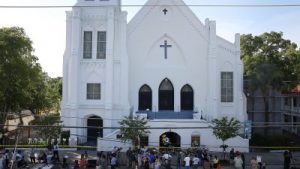(Akiit.com) One year ago, a white supremacist shot and killed nine parishioners at the Emanuel AME Church in Charleston, South Carolina. A little less than a week ago, another shooter consumed with hate shot and killed 49 people at the Pulse night club in Orlando, Florida, wounding 53 more.
Overwhelmed as we are by last weekend’s massacre in Orlando, we still feel the anguish of Charleston. In truth, we feel the anguish of terrorist attacks all over the world in recent months – in Paris, Tel Aviv, San Bernardino and elsewhere. But it’s not only anguish that we feel. It’s also anger that we have not been able to do more as a society to keep lethal weapons out of the hands of haters and extremists, whether motivated by a white supremacist ideology, a radical interpretation of Islam, or blind hatred of Muslims, LGBTQ people, or others.
It is vitally important for all of us to stand together in solidarity, and to comfort those who mourn. But it is not enough.
Let’s use the Charleston anniversary as an opportunity to rededicate ourselves to ensuring that we, as a nation, are doing all we can to fight haters, extremists, and the threat they pose to our communities.
Taking action is more necessary now than ever before.
Consider that in 2015, domestic extremists killed more people in the U.S. than in any previous year since 1995. And in 2015, for the first time, nearly as many Americans were killed by domestic Islamic extremists as by white supremacists. Sadly, the killings continue unabated.
Last year, an unprecedented 80 U.S. residents were linked to terror plots and other activity motivated by Islamic extremist ideology. They were either arrested, charged or otherwise publicly identified for their involvement in crimes ranging from providing support, attempting to fund or traveling to join terrorist groups abroad, or planning or assisting in plots here at home. Even with the exceptional work done by law enforcement agencies at every level to protect Americans, we were fortunate that there were not more lone wolf attacks.
The threat posed by white supremacists and anti-government extremists is equally urgent. In 2015, among other attacks and plots we witnessed an armed takeover of the Malheur National Wildlife Refuge in southeast Oregon and arrests of members of a white supremacist cell plotting to attack synagogues and African-American churches in Virginia. Law enforcement also disrupted an anti-government extremist plot to overthrow the government of West Virginia by force.
Charleston, Orlando, and countless other less high profile attacks and plots offer clear evidence that firearms are the deadly weapons of choice for extremists in the homeland. We must also make it more difficult to obtain firearms through increased waiting periods, safety restrictions, and limitations on purchases – especially of assault-style weapons.
It is true that none of these steps can guarantee our safety, but they would certainly make us safer. There appears to be an emerging bipartisan consensus around this issue. President Obama has repeatedly emphasized the need for legislation to curtail access to assault weapons, and this week Senate Majority Leader Mitch McConnell said “nobody wants terrorists to have firearms.” We urge leaders in both parties to prioritize this issue immediately. As Sen. Dianne Feinstein and many others have said, it is inconceivable that a person can be relegated to the no-fly list, but they are free to purchase many weapons without any hindrance. This must end.
Denying extremists and haters access to weapons is not the only legislative measure that we should consider. The United States does not have a federal domestic terrorism statute. It’s time for Congress to hold hearings to examine whether we need one. And there is work to be done at the state level to ensure that all people are protected by comprehensive and inclusive laws to combat violence motivated by hate and extremism. This will not stop terrorism, but it will ensure that we can use the full force of the law to serve justice upon those who terrorize people simply because of what they believe, where they’re from or who they love.
Finally, it is important to keep in mind that the best way to protect ourselves against extremists is to reach people before they become extremists. Anti-bias education is critically important.
It’s still time to mourn the lives lost in Orlando, but it is also time to roll up our collective sleeves and get to work. We have seen how crises pull communities together, and we have learned that we cannot afford merely to be bystanders. There is something each and every one of us can do to make a difference.
While the sense of loss stemming from the tragedy in Orlando may be overwhelming, we cannot let that emotion deter us from constructive action. We can all imagine a world without hate; what we must do now is take the steps that are necessary to translate that into a new reality.









Leave a Reply